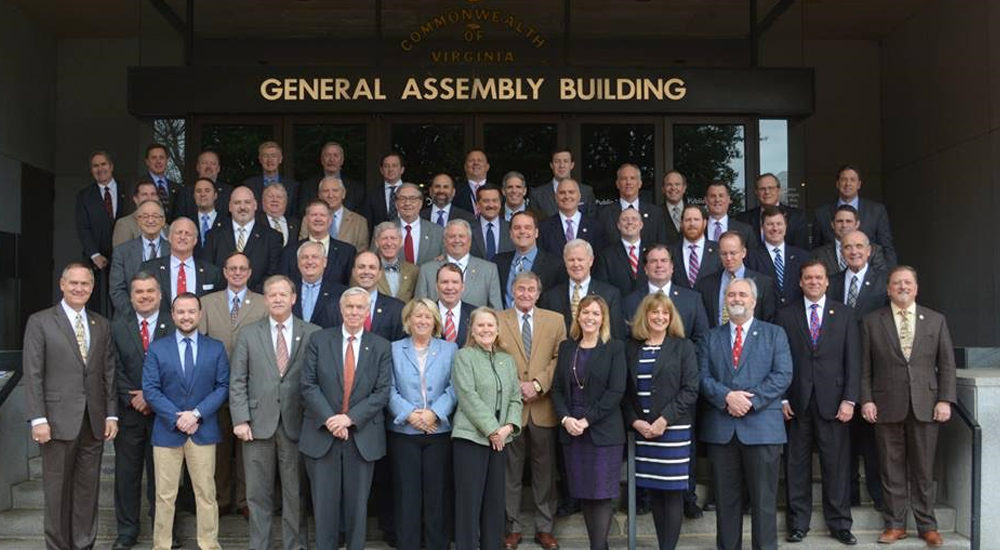General Assembly Sine Die, Part Two
In Part One of this year’s recap on the Virginia General Assembly, I took a look at popular session sound bites, Second Amendment legislation, Air B&B, and Farm Bills. Issues making the cut for this series are not necessarily those bills which successfully made it through both houses. I think it’s important to know what’s on the mind of your elected officials. I am looking at trends and to provide insight on what legislation your elected officials feel is important enough to present to the body.
One of the recurrent themes over the last few years has been legislation that dismantled the authority of local government, either in unfunded mandates, removing taxing authority without offering substitutes, or placing citizens in uncomfortable positions through what is essentially forced zoning. The journey of the “Cable Bill” through the GA this year is a pretty strong example of how far these can go and what they entail before they are done.
This bill, which demonstrates on many levels the lack of respect for local government, was Delegate Kathy Byron’s HB2108. This was essentially a hissy fit from the cable lobby who sought to prevent localities from initiating their own internet authorities.
Local governance from around the state mobilized to fight HB2108, including an intrepid group from rural Orange County who simply would not give up. My hat’s off to Orange County, who last year created, with the help of a consultant, a new strategic plan for economic development for their county. The plan addressed a number of issues standing in the way of business development, including internet. Their overall plan, created by needs only local government can identify, and financed by bonds, was not limited to internet, but did use the idea of extended connectivity to various areas of their county as a platform for smart growth and business development. Their sheer pluck by being unwilling to give up on what they knew to be bad for their county, and the derailing of their strategic plan, benefited everyone in Virginia.
This bill, too, masqueraded under the auspices of something it clearly wasn’t, and that was providing more transparency in local government and, even more fantastical, looking out for the tax payers’ dollars (yes the cable lobby says it will do this for you). In real terms, any money spent on a local authority would already show up in a county budget and is broken down by projects. Transparency is already provided at the local level. If it isn’t, a new Board of Supervisors is called for, chosen by local citizens and at their behest at election time. This is a citizen fix, not a General Assembly fix.
In a step further, it is also of note that the cable industry sought to take away the authority for local government to make proper contracts. A part of the bill called for any negotiations for contracts between counties and cities to build and install internet with private entities to be open to the public in their initial phases. However, due to persistent efforts by citizens, Boards of Supervisors and the Virginia Association of Counties, as well as the Virginia Municipal League, this was gutted, as was most of the bill. No other such contract negotiations in any other sector are public in this phase.
Most localities expressed frustration at the idea of entering the internet business in the first place and did so reluctantly when companies refused to provide it, citing their bottom line. In reality, when such options are exhausted, local government is in the best position to understand where internet is needed, where it can piggyback with other localities, or where it can link up one rural area with another via smaller local authorities. If the governor signs this one, it can be thought of as a “best practices” bill that localities already pretty much follow presently, and a complete waste of the General Assembly’s time.
This kind of obstructionist and invasive legislation, just like the “dog bill,” are unfortunate and do nothing to bring and foster services for citizens of the Commonwealth. Instead of “picking” on localities like Orange County, the GA might do better to actually study and get educated on what good, creative governance looks like in their own state.
Moving on, let’s look at a series of bills from one legislator who is not afraid to dive right in and tackle both pertinent, timely, and controversial issues. His name is Delegate Mark Cole, and he represents the 88th District in parts of Fredericksburg, Stafford, Spotsylvania, and Fauquier. I like his legislation because it is clearly crafted in response to local constituent issues or aimed at processes that are no longer conducive to electing conservative candidates in Virginia. He introduced a proposed constitutional amendment which would make major changes to how candidates are placed on the ballot. HJ635 would award that spot to the top two political candidates, regardless of party. Although it was left in Privileges and Elections, it’s worth the read and is a process followed in other states.
In response to rural citizens who feel their votes are not counted due to the turn out in more populous areas like NOVA, Delegate Cole went on to introduce HB1425, which would change how Virginia allocates electors. This one, too, was tabled in Privileges and Elections by voice vote.
Cole also floated an interesting constitutional amendment to give authority to elected school boards to impose real property taxes. HJ634 was passed by for the year, yet it opens the door to the discussion at the General Assembly level of the interminable and ugly battle which takes place between Boards of Supervisors and School Boards every spring all over Virginia. For the most part, School Boards in Virginia and the superintendents who run the show lobby every year, sometimes very aggressively, for a “money pit” solution to the issues in public education. In other words, throw money at the problem and it will go away. When governing bodies refuse to give a blank check, they are deemed hostile to public education and school board budgets enjoy almost a protected status in Virginia, akin to, “Don’t ask, Don’t tell.”
It is novel to contemplate how many Virginia citizens would be unable to pay their real estate taxes if school boards were able to tax real property. This would certainly show once and for all exactly what the mindset is with school boards. The casual attitude toward public money of many (not all) elected school boards would be disastrous and, with everyone I spoke to, it was a non-starter. The next step, I have gathered, is for legislation which would aim at bridging the disconnect between the boards by having appointed school board members statewide. This would provide a shared vision with appointees who actually understand county budgets, the various services government must provide besides public education, and how to balance accordingly. Constitutional amendments must pass two years in both houses, including an election year, in order to be added to the Virginia ballot.
Looking at the issue of voter fraud in Virginia, Cole had two bills worth mentioning. The first was HB1431, and in its first reading was probably one of my favorite bills of the session. It would have required these very questionable mystery voter groups who have appeared in the last several elections to apply to the State Board of Elections for a unique number. They then in turn, according to the bill verbiage, must assign each of their employees a number and both must appear on every form they turn in to the registrar. In this way, it would track who actually turns in fraudulent documents. Citing the costs associated with registering and tracking the unique numbers, it was amended into a bill which prohibited the compensation of those who register the most voters during a drive or election season. This is a huge step in the right direction, passing both houses.
Another Cole bill aimed at voter fraud was HB1399, an effort to reconfigure how electoral boards are appointed, and was narrowly defeated on the Senate side. This was an effort to level the playing field and give us some relief from what has happened to the state electoral board, as well as some local boards under McAuliffe, where the trend is to look the other way on fraudulently registered voters.
Senator Mark Obenshain also championed the problem of illegal voter registration. A really great bill targeting voter fraud, which passed both houses, called for local registrars to be able to investigate voter rolls that carry more names than 100 percent of the voting population. There are eight such localities in Virginia where it would be impossible for this many citizens to actually be legally registered to vote. There are a number of localities who carry 80 percent of the voting population, which is questionable as well. This has, sadly, already been vetoed by the governor.
Senator Obenshain’s much talked about HB902 Party Registration Bill, which got so much buzz online in early January, was left in Privileges and Elections.
Of course, in characteristic fashion, unfortunately for the third year in a row, Governor McAuliffe has already vetoed Delegate Rob Bell’s HB1578 Tebow Bill which would allow home schooled students to participate in public school sports.
The Opioid epidemic was also on the minds of the GA this year and on the 23rd of February, Delegate Dave Larock, who represents parts of Frederick, Loudoun, and Clarke Counties, watched Governor McAuliffe sign his HB1453. This legislation, which has an emergency clause, will increase access to the opioid overdose antidote, Naloxone, by allowing state-certified overdose reversal instructors to give it out at their training events throughout the Commonwealth.
Stay tuned for Part Three of my 2017 Virginia General Assembly recap while Governor McAuliffe alternately picks up and puts down his pen. Some of the legislation McAuliffe will reject can be overturned by a two-thirds vote of the body at the annual Veto Session in April.


